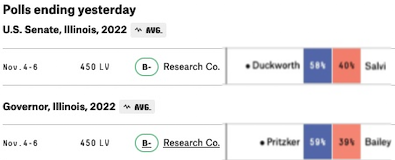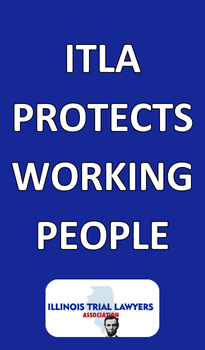|
Campaign notebook
Monday, Nov 7, 2022 - Posted by Rich Miller * Illinois early vote totals…
* Chicago early vote totals…
Chicago is now up to 20 percent of the statewide total, which is about where it was in 2018. * False alarm…
…Adding… More…
* We talked about this story last week…
Bailey told reporters yesterday that he wouldn’t answer any questions about the matter because Corrigan was still a student at Bailey’s school. * New Illinois poll published on FiveThirtyEight has Pritzker up by 20…  Caveat: That pollster had a not great 2020 cycle and is rated as B-. * From the Veep’s visit…
* Here we go…
…Adding… CD17’s Crystal Ball House rating was just moved from Tossup to Leans Republican. * Isabel’s roundup… * Crain’s | Conservative activist behind faux newspapers is done living in Illinois: “I no longer have a place in Chicago or Illinois,” Proft wrote in an email to Crain’s, “nor will I until and unless the political leadership changes and that new leadership reforms the way we fund schools and structure and fund public sector pensions and in so doing reduces the usurious property taxes Illinois families pay.” * Illinois Review | Kathy Salvi on the campaign trail gives three reasons to vote for her: Monday night, Kathy Salvi, 2022 Republican candidate for US Senate, gave a rousing speech at a rally in Lombard Monday night. Salvi gave three reasons Illinoisans should vote for her Tuesday: Economy, Crime and Education - all topics that are motivating voters to the polls. * Patch | Raoul Vs. Lawyer DeVore For Attorney General: Illinois Election 2022: As expected, Raoul and DeVore plan to take very different paths as Attorney General and have targeted their opponent’s philosophies of lawmaking on key issues facing Illinoisans. Perhaps, most notable is the controversial SAFE-T Act, the sweeping criminal justice reform package that was passed by lawmakers and that is set to go into effect on Jan. 1. Neither Raoul nor DeVore responded to multiple requests from Patch to complete a pre-election questionnaire dealing with issues facing Illinois voters in Tuesday’s general election. * Block Club Chicago | With Fewer Polling Places And Translators, Non-English Speaking Voters Could Be Discouraged, Advocates Say: Community organizers said they’ll do heavier lifting this election to help voters with language barriers cast ballots amid shakeups to the voting process. Nearly half of Chicago voters will have a different polling place for the election Nov. 8 than they did in the June primary, said Max Bever, Chicago Board of Election Commissioners spokesman. There will also be 97 fewer polling places citywide, and the board has struggled to hire poll workers, especially those who are bilingual, he said. * Pantagraph | Chilly, breezy Monday across central Illinois. What about Election Day?: Cooler today than Sunday, but near normal for this time of year. Seasonable temperatures tonight as well. What temperatures are expected for Election Day? Any chance of rain? Find out in our updated forecast video. * Shaw Local | Controversial mailer with SAFE-T Act concerns sent to DeKalb residents: Earlier this week, DeKalb resident Eric Petruchuis said he was angry when he learned his photo had been included in a publication circulating around town beneath a headline that read, “Under the SAFE-T Act, these suspects would be released into your neighborhood.” His photo was on a page with 15 other mugshots, along with full names and bullet points of the charges allegedly pending against them. No other details were published with the arrest photos. One problem, for Petruchuis at least, is it wasn’t accurate. While Petruchuis had been arrested in October, and spent a night in the DeKalb County Jail, the charges were dismissed the next day, according to court records and the DeKalb County state’s attorney’s office. * Patch | Election Day Blood Moon Last Total Lunar Eclipse Over IL Until 2025: The Election Day lunar eclipse will turn the moon an eerie red in the hours before polls open across Illinois on Tuesday. It’s the last total lunar eclipse until 2025, and that alone makes getting up early to see it worthwhile. Skies over Illinois should be partly cloudy on Tuesday during the height of eclipse activity when the moon takes on a reddish or coppery hue. If you’re not keen on watching the whole thing, the blood moon lasts from about 4:16 a.m. to 5:41 a.m. local time. * Telegraph | Haine, McRae criticize Julian, Huddleston on ‘pledges for votes’: The texts, from campaign workers for Julian and Huddleston, stated they would “uphold Illinois law which allows women to make their own healthcare choices with their doctor.” Neither Julian or Huddleston responded to a request for comment. Haine and McRae argued promising specific legal rulings during a campaign is unethical.
|
|
*** UPDATED x1 *** DeVore, Bailey close their campaigns on vax mandates
Monday, Nov 7, 2022 - Posted by Rich Miller * Yesterday…
From the story…
* Dan Proft this morning…
Um, no. Darren Bailey’s running mate was on Proft’s show and said this about vaccinations…
The connection between vaccines and autism have been thoroughly debunked. * Today, Darren Bailey and Tom DeVore held a press conference to talk about the “revelations”…
DeVore eventually got the audience riled up and then stormed out of the press conference when Mary Ann Ahern asked a question about the Proft papers. *** UPDATE *** From the governor’s office…
…Adding… DeVore calls a reporter doing her job “disrespectful”…
Doesn’t he have the word “Freedom” tattoed on his arm? Must mean freedom from questions. …Adding… Capitol News Illinois…
|
|
Live coverage
Monday, Nov 7, 2022 - Posted by Isabel Miller * Follow along with ScribbleLive…
|
| « NEWER POSTS | PREVIOUS POSTS » |















